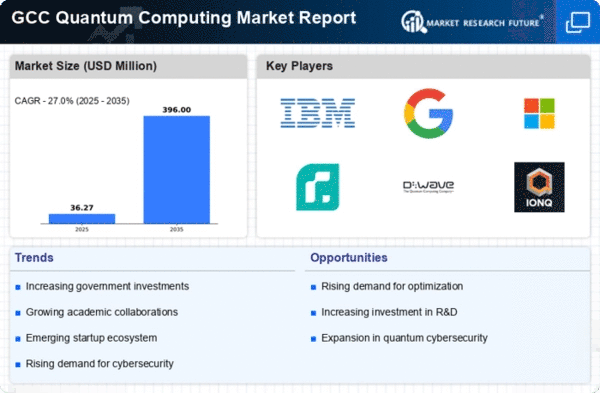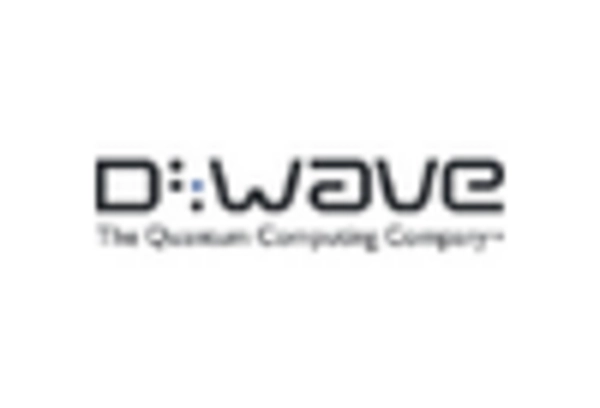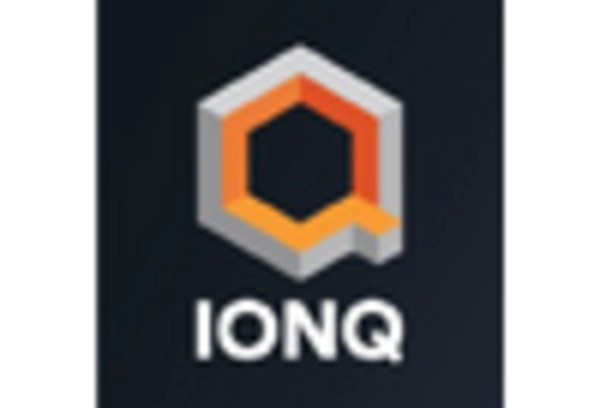Strategic Government Investments
Governments in the GCC are making strategic investments in the quantum computing market to foster innovation and technological advancement. Initiatives aimed at developing national quantum strategies are being implemented, with funding allocated to research institutions and startups focused on quantum technologies. For example, the UAE has established a national quantum program that aims to position the country as a leader in quantum research and applications. Such government support is crucial for building a robust ecosystem that encourages collaboration between academia and industry. The financial commitment from governments is expected to stimulate growth in the quantum computing market, potentially leading to breakthroughs that could transform various sectors.
Emerging Startups and Innovation Hubs
The emergence of startups and innovation hubs in the GCC is playing a pivotal role in shaping the quantum computing market. These entities are often at the forefront of developing novel quantum algorithms and hardware solutions, contributing to the overall advancement of the industry. The presence of incubators and accelerators dedicated to quantum technologies is fostering a culture of innovation, attracting talent and investment. As these startups collaborate with established companies and research institutions, they are likely to drive significant advancements in quantum computing applications. This dynamic environment is expected to enhance the competitiveness of the quantum computing market, with new solutions emerging to address industry-specific challenges.
International Collaborations and Partnerships
International collaborations and partnerships are becoming increasingly prevalent in the quantum computing market, particularly within the GCC. These collaborations often involve joint ventures between local companies and global technology leaders, facilitating knowledge transfer and access to cutting-edge technologies. Such partnerships can enhance the capabilities of GCC-based firms, enabling them to compete on a global scale. For instance, collaborations with leading research institutions in Europe and North America may provide GCC companies with insights into the latest quantum computing advancements. This interconnectedness is likely to accelerate the growth of the quantum computing market, as shared resources and expertise contribute to the development of innovative solutions.
Rising Demand for Advanced Computing Solutions
The quantum computing market is experiencing a surge in demand for advanced computing solutions across various sectors in the GCC. Industries such as finance, healthcare, and logistics are increasingly seeking to leverage quantum computing capabilities to solve complex problems that traditional computing cannot efficiently address. For instance, the financial sector is exploring quantum algorithms for risk analysis and portfolio optimization, which could potentially enhance decision-making processes. As organizations recognize the limitations of classical computing, the quantum computing market is projected to grow significantly, with estimates suggesting a compound annual growth rate (CAGR) of over 30% in the coming years. This rising demand is likely to drive investments in quantum technologies, further propelling the market forward.
Growing Interest in Quantum Research and Development
There is a growing interest in quantum research and development within the GCC, which is significantly impacting the quantum computing market. Academic institutions and research organizations are increasingly focusing on quantum mechanics and its applications, leading to a rise in publications and patents related to quantum technologies. This academic interest is often supported by government funding and partnerships with private sector entities, creating a collaborative research environment. As more researchers engage in quantum studies, the potential for innovative applications in fields such as cryptography, materials science, and artificial intelligence is likely to expand. This focus on R&D is expected to drive advancements in the quantum computing market, paving the way for new technologies and solutions.
















